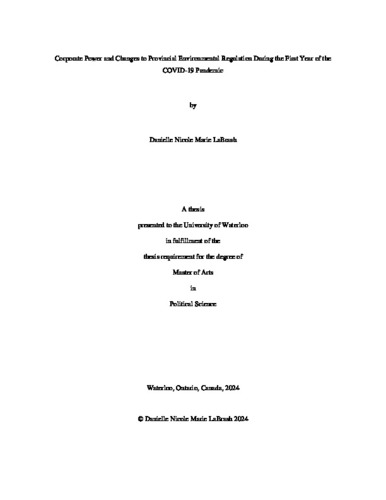| dc.contributor.author | LaBrash, Danielle | |
| dc.date.accessioned | 2024-03-14 20:10:42 (GMT) | |
| dc.date.available | 2024-03-14 20:10:42 (GMT) | |
| dc.date.issued | 2024-03-14 | |
| dc.date.submitted | 2024-03-04 | |
| dc.identifier.uri | http://hdl.handle.net/10012/20396 | |
| dc.description.abstract | How have Canada’s largest oil producing provinces altered key environmental policies since
the onset of COVID-19, in response to the dual pressures of an oil sector in distress and the
imperative to reduce emissions? While regulatory changes have been reported in the media, they have
not yet been systemically reviewed or explained; this project aims to fill that gap.
Oil markets went into crisis in early 2020 as oil prices plummeted following an oil price war
between Russia and Saudi Arabia and the economic downturn caused by the COVID-19 pandemic.
Meanwhile, the global community has entered into a critical decade in climate history: the
Intergovernmental Panel on Climate Change has stated that a sharp reduction in emissions over the
next decade is needed to avoid the worst consequences of climate change. Government policy
interventions in this moment are both determining the future of the oil sector and defining
possibilities for climate change mitigation.
This thesis analyzes changes to regulations made by the oil-producing provinces of
Saskatchewan and Newfoundland and Labrador at this critical moment. Conducting a full review of
provincial regulatory changes during the pandemic, I find that in the first year of the COVID-19
pandemic Canada’s oil provinces demonstrated a clear pattern of supporting the oil sector by
weakening provincial environmental regulation surrounding the sector. Regulatory changes observed
in 2020 can be explained in part by considering corporate power, and strategies used by oil
corporations to influence government, in each province. These changes to provincial regulatory
frameworks shape Canada’s response to the ongoing economic and climate crises, and further expose
Canadians to both the risks of climate change and the economic risk of an oil sector in long-term
decline. | en |
| dc.language.iso | en | en |
| dc.publisher | University of Waterloo | en |
| dc.subject | climate change | en |
| dc.subject | corporate power | en |
| dc.subject | regulation | en |
| dc.subject | oil | en |
| dc.subject | Newfoundland and Labrador | en |
| dc.subject | Saskatchewan | en |
| dc.subject | environmental regulation | en |
| dc.title | Corporate Power and Changes to Provincial Environmental Regulation During the First Year of the COVID-19 Pandemic | en |
| dc.type | Master Thesis | en |
| dc.pending | false | |
| uws-etd.degree.department | Political Science | en |
| uws-etd.degree.discipline | Political Science | en |
| uws-etd.degree.grantor | University of Waterloo | en |
| uws-etd.degree | Master of Arts | en |
| uws-etd.embargo.terms | 0 | en |
| uws.contributor.advisor | Clapp, Jennifer | |
| uws.contributor.advisor | Henstra, Daniel | |
| uws.contributor.affiliation1 | Faculty of Arts | en |
| uws.published.city | Waterloo | en |
| uws.published.country | Canada | en |
| uws.published.province | Ontario | en |
| uws.typeOfResource | Text | en |
| uws.peerReviewStatus | Unreviewed | en |
| uws.scholarLevel | Graduate | en |

